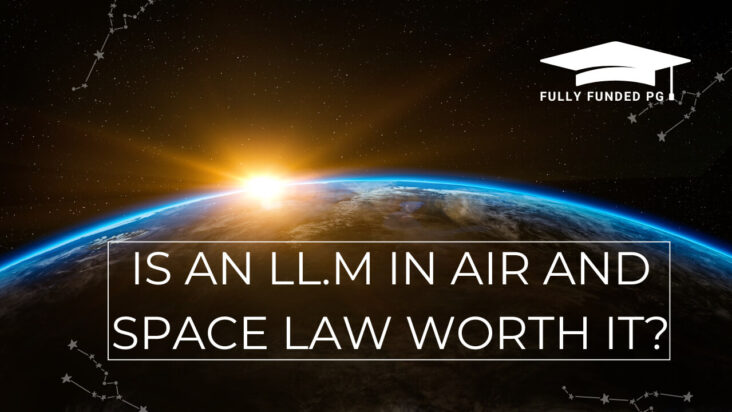As air travel and space exploration continue to expand, the legal frameworks governing these industries must evolve to address emerging challenges.
From airline regulations and international airspace agreements to commercial space travel and satellite governance, Air and Space Law is a highly specialized field that requires legal expertise beyond a general law degree.
An LL.M. (Master of Laws) in Air and Space Law offers advanced knowledge in this niche area, but is it worth pursuing? The answer depends on your career goals, interest in aviation and space law, and the opportunities available in this growing sector.
What is an LL.M. in Air and Space Law?
An LL.M. in Air and Space Law is a specialized Master of Laws (LL.M.) degree that focuses on the legal frameworks governing aviation and outer space activities.
This program provides in-depth knowledge of international and national regulations related to air transport, space exploration, satellite communications, and emerging aerospace technologies. It covers key areas such as air navigation laws, airline liability, space treaties, environmental concerns in aviation, and commercial space ventures.
Given the rapid advancements in space exploration and the increasing complexity of air travel regulations, this field is crucial for legal professionals seeking expertise in the aerospace industry. Students pursuing an LL.M. in Air and Space Law typically engage in courses that examine the roles of organizations such as the International Civil Aviation Organization (ICAO) and the United Nations Office for Outer Space Affairs (UNOOSA).
The program also addresses contemporary issues like space tourism, drone regulations, and the commercialization of outer space. Graduates can pursue careers in government agencies, international organizations, private aerospace companies, or law firms specializing in aviation and space law. With the global expansion of the aerospace sector, this LL.M. offers a unique opportunity for legal professionals to contribute to shaping the future of air and space governance.
An LL.M. in Air and Space Law is a postgraduate legal degree that focuses on the regulations, policies, and legal issues related to aviation and outer space activities. It covers a broad range of topics, including:
- International Air Law – This covers treaties, regulations, and policies governing global air transportation, air traffic rights, and liability laws.
- Space Law – This aspect explores the legal framework surrounding space exploration, satellite deployment, commercial space flights, and space resource utilization.
- Aviation Safety and Security Laws – This focuses on international standards for airline safety, accident investigations, and counterterrorism measures.
- Airline and Aerospace Industry Regulations – Aerospace regulation examines the legal aspects of airline management, aircraft financing, and aviation business operations.
- Environmental Law in Aviation and Space – This addresses the impact of aviation and space activities on the environment, including carbon emissions and space debris management.
This specialized degree is typically designed for law graduates, legal professionals, or policymakers who want to work in the aviation, space, or regulatory sectors.
Benefits of Pursuing an LL.M. in Air and Space Law
1. Specialized Expertise in a Niche Field: Air and space law is a unique legal discipline with growing importance. As technology advances and space commercialization increases, legal experts in this field are needed to develop regulations and resolve disputes. An LL.M. in this area gives you specialized knowledge that sets you apart from general legal practitioners.
2. Diverse Career Opportunities: Graduates of this program can work in various sectors, including:
- Government and Regulatory Agencies – National and international bodies like the Federal Aviation Administration (FAA), European Union Aviation Safety Agency (EASA), and the United Nations Office for Outer Space Affairs (UNOOSA).
- Private Aerospace Companies – Legal advisory roles in companies such as SpaceX, Boeing, Airbus, and Blue Origin.
- Law Firms Specializing in Aviation and Space Law – Working on liability cases, contracts, and compliance matters.
- International Organizations – Positions at ICAO (International Civil Aviation Organization) or the UN, focusing on global air and space policies.
3. High Demand for Air and Space Law Professionals: With the rise of commercial space travel, satellite technology, and drone regulations. With increasing global air traffic, there is a growing demand for legal professionals who understand these complex areas. Companies and governments need experts who can navigate emerging legal challenges, making this LL.M highly relevant.
4. Influence on Policy and Innovation: Air and space law experts play a crucial role in shaping policies that impact global aviation and space exploration. If you’re interested in contributing to international treaties, space governance, or the future of commercial air travel, this LL.M. offers the opportunity to be at the forefront of these discussions.
5. Networking and International Collaboration: Since aviation and space activities are inherently global, this field involves extensive international cooperation. Many LL.M. programs offer the chance to study at top institutions, attend international conferences, and collaborate with industry leaders, opening doors to prestigious career paths.
Challenges and Considerations
1. Limited Job Market Compared to General Law Fields: While the demand for air and space law professionals is increasing, the job market is still more specialized than traditional legal fields like corporate law, intellectual property, or criminal law. Positions in this area often require experience, so entry-level opportunities may be more competitive.
2. Cost of the LL.M. Program: Pursuing an LL.M. can be expensive, with tuition fees ranging from $20,000 to $60,000 or more, depending on the institution. While scholarships and funding options exist, it’s important to weigh the return on investment based on your career goals.
3. Requires Technical and Regulatory Knowledge: Unlike some legal fields, air and space law often involves understanding technical and regulatory aspects of aviation and space operations. A background in international law, regulatory affairs, or even some familiarity with aerospace technology can be beneficial.
Is an LL.M. in Air and Space Law Worth It?

An LL.M. in Air and Space Law is worth it if you have a strong interest in aviation, aerospace industries, and international legal frameworks. It is an excellent choice for legal professionals looking to enter a highly specialized and dynamic sector. With the increasing privatization of space exploration, the rise of commercial aviation, and the growing need for international cooperation in aerospace regulation, legal expertise in this field is more relevant than ever.
Governments, space agencies, international organizations, and private companies require skilled legal minds to navigate the complexities of treaties, liability issues, and emerging aerospace technologies. By pursuing this degree, you position yourself as a specialist in an area that is critical to the future of transportation and space exploration.
Moreover, the niche nature of Air and Space Law means that competition for roles is lower compared to broader legal fields, giving LL.M graduates an advantage in securing high-impact positions. Many legal professionals with this degree find roles in global aviation regulatory bodies, space law advisory firms, and high-profile aerospace companies like NASA, SpaceX, and Boeing.
Additionally, as space tourism and drone technology continue to evolve, the legal landscape will require professionals who can develop new policies and frameworks to govern these advancements. This specialization allows you to be at the forefront of shaping international laws in a field that is rapidly expanding.
Beyond career opportunities, this LL.M. provides a chance to work on cutting-edge legal issues that have global significance. From ensuring safe and sustainable space exploration to advising on air traffic regulations that affect millions, professionals in this field contribute to policies that impact industries and governments worldwide. If you are eager to be part of a forward-thinking legal discipline that blends science, technology, and international law, investing in an LL.M. in Air and Space Law is undoubtedly worth it.

